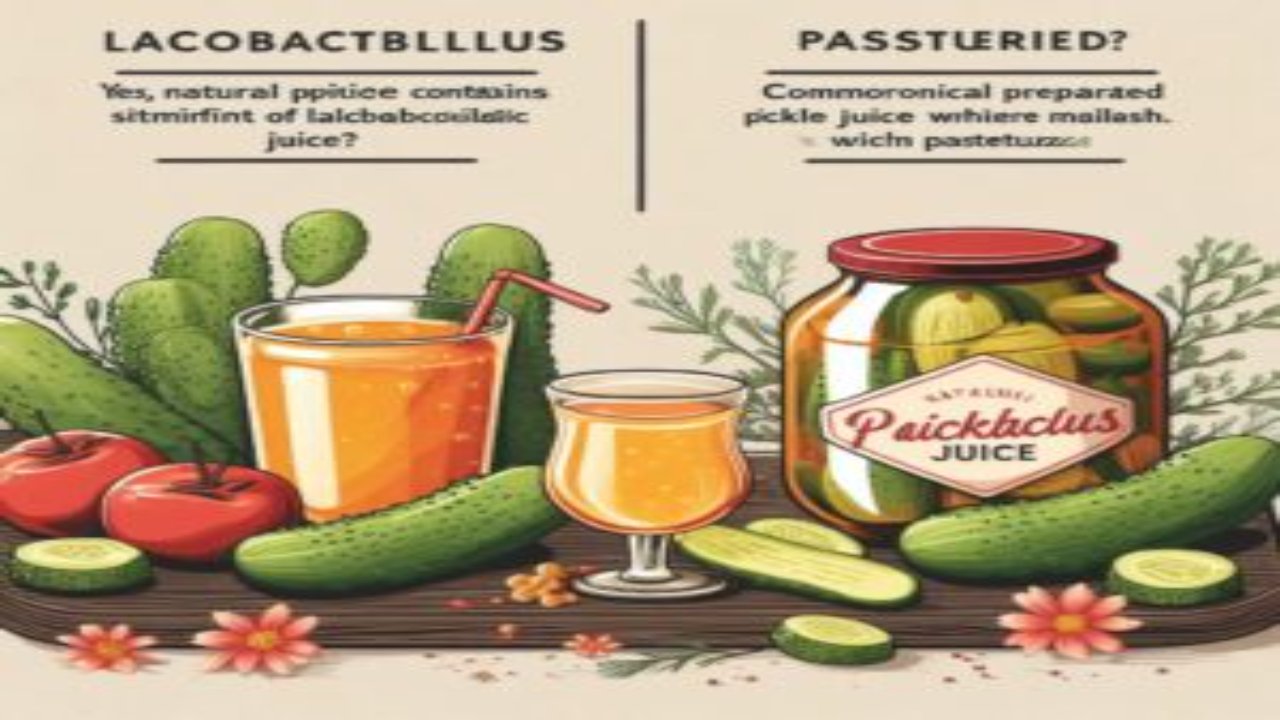Pickle juice, the sour and tangy liquid from pickling vegetables, has recently become a health tonic. While it may seem like an unlikely health elixir, many swear by its benefits. But is pickle juice good for health? In this blog post, we will take a closer look at the potential health benefits of pickle juice and whether or not it lives up to the hype. So grab a jar of pickles and read on to learn more about this unique beverage and its impact on our health.
Hydration:
Pickle juice, surprisingly, can be a great way to stay hydrated. While it may not be as refreshing as water, it does contain electrolytes, which are essential for maintaining proper hydration levels in the body. When we sweat or engage in intense physical activity, we lose electrolytes such as sodium and potassium. These electrolytes are crucial for maintaining the balance of fluids in our bodies. Pickle juice, a brine made from vinegar, salt, and water, is packed with these essential electrolytes.
Drinking pickle juice can help replenish the electrolytes lost during exercise or hot weather, preventing dehydration. Additionally, the vinegar in pickle juice may aid digestion and absorption of fluids in the body, further contributing to hydration.
However, it is essential to note that pickle juice is high in sodium, so individuals with high blood pressure or those on a low-sodium diet should consume it in moderation. Furthermore, it should not replace plain water as the primary source of hydration.
So, next time you need a refreshing drink to rehydrate, don’t discount pickle juice. It may just be the electrolyte-packed beverage you’ve been searching for.
Muscle cramp relief:
Muscle cramps can be excruciating and debilitating. Whether you experience them during exercise or while resting, finding relief is crucial. Surprisingly, pickle juice may be just what you need to alleviate those cramps.
Studies have shown that pickle juice can help reduce muscle cramps and improve muscle function. The high sodium content in pickle juice is believed to trigger a reflex in the mouth, which sends a signal to the brain to relax the cramping muscle. Additionally, the vinegar in pickle juice is thought to help balance the pH levels in the body, reducing the likelihood of muscle cramps.
But don’t just take our word for it. Many athletes and fitness enthusiasts swear by the power of pickle juice to quickly relieve muscle cramps. It is even commonly used by sports teams to prevent and treat muscle cramps during intense physical activity.
So, next time you’re hit with a painful muscle cramp, reach for that jar of pickle juice. It may be the secret weapon you’ve sought to find fast and effective relief.
Blood sugar control:
Blood sugar control is an essential aspect of overall health, especially for individuals with diabetes or prediabetes. So, can pickle juice have a positive impact on blood sugar levels?
Some research suggests that pickle juice may help regulate blood sugar levels. This is due to the acetic acid in vinegar, a key ingredient in pickle juice. Acetic acid has been shown to improve insulin sensitivity and reduce blood sugar spikes after meals. It may also enhance the body’s ability to break down carbohydrates, potentially leading to more stable blood sugar levels.
However, it’s important to note that the research in this area is limited, and more studies are needed to fully understand the effects of pickle juice on blood sugar control. It’s also worth mentioning that pickle juice is typically high in sodium, so individuals with high blood pressure or those on a low-sodium diet should consume it in moderation.
In summary, while there is some evidence suggesting that pickle juice may have a positive impact on blood sugar control, it’s always best to consult with a healthcare professional before making any changes to your diabetes management routine.
Gut health:
Gut health is a hot topic in the world of wellness, and it turns out that pickle juice may have some benefits in this department as well. The probiotics in pickles, such as Lactobacillus, can contribute to a healthy gut microbiome. These beneficial bacteria help support digestion, promote nutrient absorption, and even boost our immune system.
Additionally, pickle juice is naturally fermented, which means it contains enzymes that aid in digestion. These enzymes can help break down food more efficiently and ease digestive discomfort or bloating. The vinegar in pickle juice also acts as a natural antibacterial, helping to kill off any harmful bacteria in our gut.
While more research is needed to understand the impact of pickle juice on gut health fully, many people have reported positive effects after incorporating it into their diet. Just remember to choose pickles that are naturally fermented rather than those made with vinegar and artificial additives for the best gut-boosting benefits. So go ahead and give your gut some love with a shot of pickle juice!
Antioxidants:
Antioxidants play a crucial role in our overall health and well-being. They are compounds that help protect our cells from damage caused by harmful molecules called free radicals. So, does pickle juice contain antioxidants, and can it contribute to our antioxidant intake?
While pickle juice may not be as high in antioxidants as some other foods, it does contain trace amounts of certain antioxidants, such as vitamin C and beta-carotene. These antioxidants can help neutralize free radicals and reduce oxidative stress in the body. Additionally, pickle juice is made from vegetables that have been pickled, such as cucumbers, which are themselves a good source of antioxidants.
While the exact antioxidant content of pickle juice may vary depending on the ingredients and the pickling process, incorporating it into your diet can still provide some antioxidant benefits. However, it’s important to note that pickle juice should not be relied upon as your primary source of antioxidants. It’s always best to consume a varied and balanced diet that includes a wide range of fruits and vegetables to ensure an adequate intake of antioxidants.
So, while pickle juice may contribute some antioxidants to your diet, it’s still important to focus on overall dietary diversity to meet your antioxidant needs.
Risk Factors
While pickle juice may have some potential health benefits, it’s essential to consider the potential risk factors associated with its consumption. One primary concern is the high sodium content in pickle juice. Excessive sodium intake can lead to high blood pressure and an increased risk of heart disease. Individuals with high blood pressure or those on a low-sodium diet should consume pickle juice in moderation or consider alternative options for hydration and muscle cramp relief.
Another factor to consider is the acidity of pickle juice. The vinegar in pickle juice can cause acid reflux or heartburn in some individuals, especially those with preexisting digestive issues. It’s essential to listen to your body and discontinue use if you experience discomfort or negative symptoms.
Additionally, while pickle juice may benefit blood sugar control, individuals with diabetes should be cautious. Pickle juice can cause a sudden drop in blood sugar levels, so it’s important to monitor glucose levels and consult with a healthcare professional before incorporating pickle juice into your diabetes management routine.
Overall, while pickle juice may offer some health benefits, it’s essential to consider these risk factors and make informed decisions based on your individual health needs.

